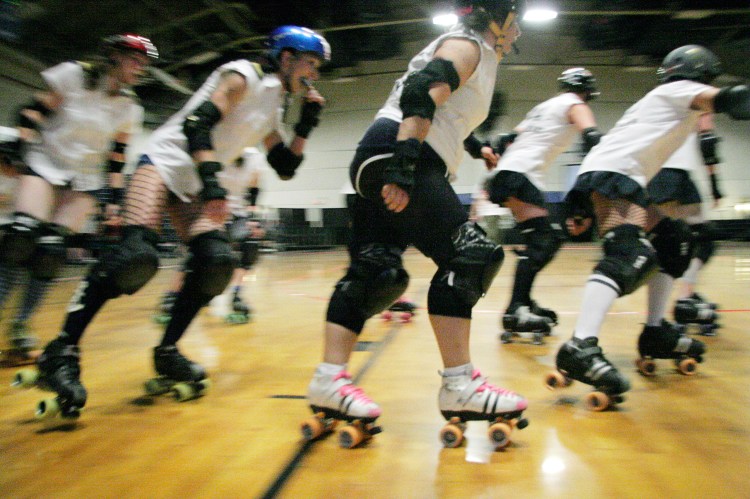By just about any definition, roller derby is a contact sport. Bumping, pushing, blocking and sending your opponent tumbling in a heap of limbs, wheels and road rash is pretty much the point, if not a fringe benefit.
The problem is, in Maine, contact in roller derby is apparently against state law.
Really.
A bill that would end that prohibition was advanced Thursday by top lawmakers on the Legislative Council, as they considered what measures to accept in the second regular session of the Legislature, which begins in January. The panel approved a number of other bills for debate, including a proposal to control videotaping at Maine polling places.
Although the roller derby bill was accepted for consideration, it didn’t happen without giggles and a dash of incredulity.
“Can I just clarify that we’re now considering an emergency bill that seeks to promote roller derby?” asked House Republican leader Kenneth Fredette of Newport.
Fredette’s skepticism reflects the expectation that bills accepted for debate in the second session are technically supposed to be emergencies – such as budget bills, fixes to broken laws or responses to the drug crisis. The roller derby bill’s title, “An Act to Promote Roller Derby,” doesn’t exactly impart a sense of urgency.
But to a group of women in the Maine Roller Derby league, ending the prohibition on contact is a big deal. In an email to the Legislative Council, Rep. Diane Russell, D-Portland, said Maine Roller Derby participants are hoping to expand the sport to include junior roller derby.
IT’S NOT ROLLER DERBY WITHOUT COLLISIONS
The problem lies within a provision of law that defines the responsibilities of skaters at roller rinks. It says, “A skater attempting to overtake other skaters shall do so in a manner that avoids collision with objects and other skaters in that skater’s field of vision.”
The prohibition was adopted by the Legislature in 1991 in an apparent attempt to limit the liability of rink owners and shift it to skaters.
The council, which has an equal number of Republicans and Democrats, voted 6-4 Thursday to accept the bill into the session. The bill’s details will be made public in January.
“Changing this law is going to legalize roller derby in Maine, which has been – technically – illegal,” said Heather Steeves, 28, who skates as Hard Dash for Maine Roller Derby. The timing is important, she said, because Maine Roller Derby has a capital campaign underway to buy a property to grow the sport, in part by creating a junior roller derby for children and young women.
“Derby is such a positive influence in so many women’s lives in Maine, but most people don’t even know about the sport,” said Steeves, who founded Rock Coast Rollers in Rockland. “We have several leagues in rural areas where there are not a lot of options for adult women to exercise and build a community.”
VIDEOTAPING THAT DOESN’T INTIMIDATE VOTERS
The bill to control videotaping at polling places was motivated by complaints that gun rights activists were intimidating voters when they gathered at several southern Maine polling places on Election Day. The activists were filming a signature-gathering effort by supporters of gun control who hope to advance a referendum next year.
The videotaping proposal by Sen. Bill Diamond, D-Windham, was one of 26 bills submitted after the Sept. 25 deadline.
Diamond, a Windham Democrat and former secretary of state, said the measure wouldn’t prohibit recording but attempts to ensure that recording of signature gathering – a public process – doesn’t infringe on the private act of voting. He said he consulted with Secretary of State Matt Dunlap when drafting his bill.
Diamond said they both believe the recording that occurred on Election Day was a “serious problem,” but it couldn’t be solved by creating no-video zones around polling booths because polling places vary significantly. Instead, Diamond is proposing to give election wardens clear authority to ask those who are making videos to move away from ballot boxes if voters complain.
RULES FOR WHEN STATE STAFF CALLED TO TESTIFY
“With so many citizen initiatives on the ballot and a presidential election, turnout in 2016 could be the highest ever recorded in our state,” Diamond said in a written statement. “We must make sure that our election wardens are empowered to act whenever voters feel intimidated by political activity happening inside the polling place.”
The Legislative Council tabled several other bills Thursday, including one that would compel state officials to appear before legislative committees if formally requested. The bill, sponsored by Sen. Roger Katz, R-Augusta, is in response to Gov. Paul LePage’s new protocols that require his final approval.
Katz said the governor’s rules restricting communication with department heads have made it difficult for legislators to do their jobs.
“It’s sad that we even need this, and we haven’t needed this in over 195 years,” he said. “But it appears we need it now.”
Send questions/comments to the editors.



Success. Please wait for the page to reload. If the page does not reload within 5 seconds, please refresh the page.
Enter your email and password to access comments.
Hi, to comment on stories you must . This profile is in addition to your subscription and website login.
Already have a commenting profile? .
Invalid username/password.
Please check your email to confirm and complete your registration.
Only subscribers are eligible to post comments. Please subscribe or login first for digital access. Here’s why.
Use the form below to reset your password. When you've submitted your account email, we will send an email with a reset code.